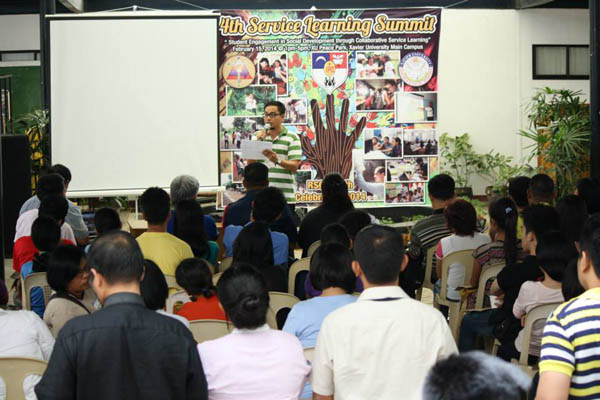
by Agnes Carmela P Centro, KKP
In celebration of the Research and Social Outreach Month, Xavier University through Kristohanong Katilingban sa Pagpakabana – Social Involvement Office (KKP-SIO), hosted the 4th Service Learning Summit with the theme: “Student Engagement in Social Development through Collaborative Service Learning” on February 15, 2014 at the XU Peace Park and AVRs of Xavier University Main Campus.
The 4th Service Learning Summit aims to provide a venue for students to share their various engagements to the academe and project stakeholders – the community – as well as to facilitate discussions regarding their project outputs with their faculty mentors, the college department heads and/or college deans, and their partner communities. It highlighted the students’ significant experiences and insights gained during their community engagements that deepened their commitment for advocating social justice through Dialogue Education. This year’s summit also presented the Service Learning (SL) engagement on the AgroEnterprise expansion in Misamis Oriental State College of Agriculture (MOSCAT) in Claveria, Misamis Oriental and Technology and Central Mindanao University (CMU) in Musuan, Bukidnon.
Fr. Roberto Yap, SJ, President of Xavier University, gave the opening message. He emphasized the 3 important elements of the Service Learning Program, namely: expertise-based, community impact, and personal contact. In service learning, students carry with them their scientific and technical expertise putting theories into practice. Community impact is realized by addressing and responding to the needs of the community, especially the poor and the marginalized. Personal contact is where the value of learning comes in. The person-to-person encounter of the Ateneo students with the partner community enriches their experience and allows them to learn from the community.
Fr. Yap also set the emerging “signs of the times” which shall be the areas of future SLP engagements. First, the SL engagements are called to respond to those who are affected by the changing climate, many of those much affected are the poor. Second, he encouraged future SLP engagements to give importance to the “sense of community” where collaboration and sharing are present. Lastly, he encouraged Service Learning to focus on the care for the environment, as this is the crucial call of the signs of the times.
The Summit began with a plenary where all the participants gathered for the presentation of the involvement of the academic departments in the Social Consciousness and Awareness Month. A brief presentation of CSLP (Collaborative Service Learning Program) of KKP-SIO and model SL projects from the past school years were shared to the participants – students, faculty members, administrators from XU, various partners, from other schools and other institutions.
The second part of the summit was the presentation of best practices in the Service Learning Program. It served as a venue for the presentation of the different SL project outputs within the school year 2013-14 with their respective stakeholders and other participants. The projects were clustered according to RSO themes with the community partners. An open forum was facilitated for the community partners and institutions, as well as the department heads and college deans, to discuss the recommendations and insights gained based on the outputs.
From the break-out presentations, the summit was able to realize the challenge of connecting the SL projects directly to the stakeholders, lobbying the knowledge-product to the partner communities and institutions for the usability of the efforts that primarily addressed the needs of the society. It also commended the engagement for being expertise-based having students as experts who are able to share their knowledge and practice their skills at the same time. Moreover, the participating schools, MOSCAT and CMU, recognized their opportunities for more SL engagements on agro-enterprise expansion with the Catholic Relief Services through the XU FARM Project.
The faculty and students who actively participated in the Service Learning Program for this school year came from the College of Computer Studies, and the Departments of Economics, Civil Engineering, Biology, Chemistry, Accountancy, Sociology-Anthropology, Development Communication, and the KKP Student Volunteer Formation Program.
The participating partner communities and institutions included Organized Cooperatives (LAMPCO, BADECO, and UPPCCO) in Brgy Lumbia and community partners in Brgy Macasandig through the KKP-PEACE Project, Xavier Ecoville Homeowners Association, Morning Mist Homeowners Association, San Agustin Valley Homes Homeowners Association, Roads and Traffic Administration (RTA), Cagayan de Oro City Police Office (COCPO), Bureau of Agricultural Statistics (BAS), Department of Health (DOH), Habitat for Humanity Talungan Homeowners Association, Gawad Kalinga Basakan BDO-SM Homeowners Association, City Economic Enterprise Department, the Hapsay Dalan Task Force, and the City Accounting Office. Moreover, Liceo de Cagayan University and Capitol University extension officers together with their students participated also in the program.